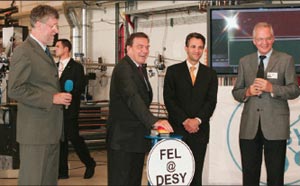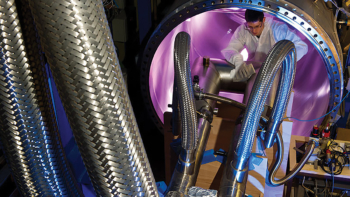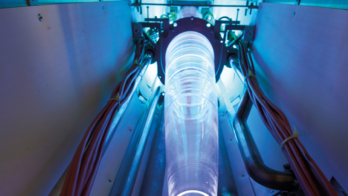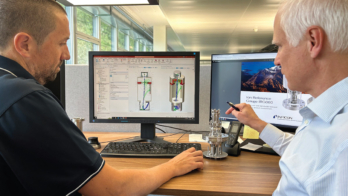With the push of a button, on 3 August German Federal Chancellor Gerhard Schröder handed DESY’s new vacuum-ultraviolet free-electron laser, VUV-FEL, over to the scientists. The VUV-FEL is the world’s first free-electron laser for generating the short-wavelength range of ultraviolet radiation, and will open up new insights into fields such as cluster physics, solid-state physics, surface physics, plasma research and molecular biology.

The VUV-FEL makes use of new technology developed at DESY from 1992 to 2004 by the international TESLA Collaboration. In a first step, electrons are brought to high energies by a superconducting linear accelerator. They then race through an undulator, a periodic arrangement of magnets that forces them to follow a slalom course and radiate. Thanks to the novel principle of self-amplified spontaneous emission (SASE), this radiation finally emerges in the form of short-wavelength, intense flashes of laser light.
The VUV-FEL produces coherent radiation with a wavelength tunable in the range 6-30 nm and a peak brilliance that surpasses that of modern synchrotron radiation sources by a factor of 10 million. Its very intense radiation pulses last only 10-50 fs, allowing researchers to observe directly the formation of chemical bonds, for example, or the processes that occur during magnetic data storage. In addition, operation of the VUV-FEL will provide important insights for the 3.4 km-long European X-ray laser (XFEL) that is being planned in Hamburg. The XFEL will generate even shorter wavelengths down to 0.085 nm and should begin operation in 2012.
As a user facility, the VUV-FEL will offer five experimental stations at which different instruments can be operated alternately. At present, 29 research projects are planned at the VUV-FEL. These will be carried out by around 200 scientists from 60 institutes in 11 countries. The project’s total cost is 7117 million, financed 90% by Germany and 10% by international partners.





